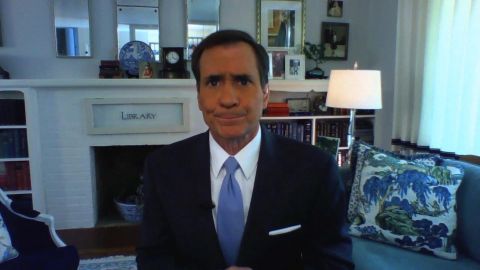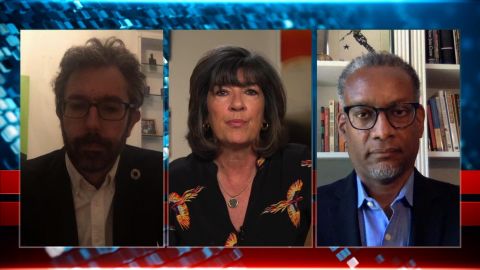Read Transcript EXPAND
CHRISTIANE AMANPOUR: Do you believe that a truth and reconciliation process like what happened in South Africa, there’s not even been a hint of that in America, could happen, could actually be something to try once and for all?
VINCENT WARREN, EXECUTIVE DIRECTOR, CENTER FOR CONSTITUTIONAL RIGHTS: To answer that question, Christiane, I would talk about the question about violence. And I’m glad that you mentioned it, because America has been built on violence in just the way that you said. But violence by the state is not considered violence to most people, it’s considered national security. It’s considered police actions. It’s considered a whole range of activities that are framed to keep white people safe at the hands or to the detriment of black people, native people and brown people. So, when we think about — even if you think about how we’re talking about the situation now, all of the media is talking about when — at what point these protests turn violent. None of the media, at the time that violence is committed against black people, say the police have been violent. State violence is — has been and is at an epidemic proportion. People are realizing that you can’t use state violence to solve political problems, you can’t use state violence to solve social problems and you can’t use state violence to solve racial problems. But that is our number one tool. In America, we have always had a punitive reflex. I agree that a high state level acknowledgment of this fact, and there are many examples through history, is really key. Additionally, though, we have a problem in the United States with respect to truth and reconciliation hearings. As Paul will tell you, that is largely a political process that you need the political will to be able to move forward. The truth and reconciliation process, I monitored a little bit of it in 1997, happened after the country had made a political transition. This country is still in the process of making a political transition. Which then brings us to the attorney general. The attorney general, Keith Ellison, had the people of Minnesota not live through the past five, six, seven, 10, 15 years of police violence against black people. It is a symbol that the times have changed and they’ve hired — I’m sorry, they’ve elected someone who is willing to move that change forward. Last point, the police are the problem, but they’re not the only problem. Paul will tell you that apartheid ran deep and the policing was a mechanism, a symptom of social control. It is the same here, that situations go much deeper in the United States than policing, including what was made by bare COVID and the inequality and the way that black people don’t have access to what they need.
About This Episode EXPAND
Christiane speaks with former U.S. Deputy Assistant Secretary of Defense John Kirby and former Commander of U.S. Forces in Afghanistan John Allen about President Trump’s militaristic actions. She also speaks with Paul van Zul and Vincent Warren about what the U.S can learn from South Africa’s transition out of apartheid. Michel Martin speaks with Mark Bray about the president’s remarks on Antifa.
LEARN MORE



